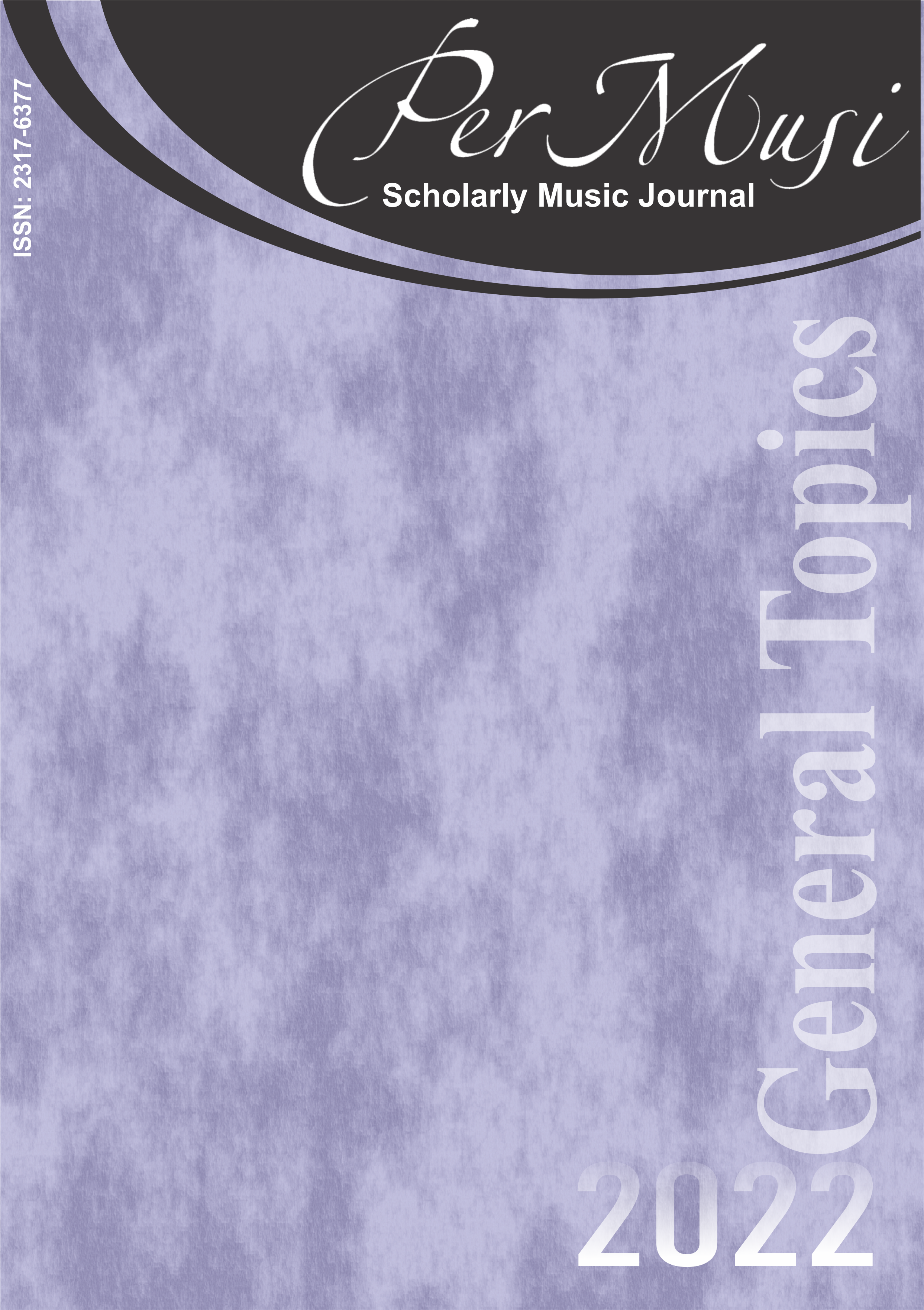‘Ciclo Artístico-Reflexivo de Dupla Checagem’ (CARDC)
A proposição de uma ferramenta metodológica no campo da Investigação Artística
DOI:
https://doi.org/10.35699/2317-6377.2022.39994Palavras-chave:
Prática instrumental como pesquisa, autoetnografia, Estratégias de estudo, investigação artística em músicaResumo
Este artigo consiste em um estudo no campo da investigação artística que propõe a aplicação de uma ferramenta metodológica específica para a construção de uma interpretação, baseada no estudo de obras do compositor Flausino Valle (1894-1954). O foco consiste na observação do processo, com considerações de questões técnicas e musicais e com o objetivo de sistematizar e propor uma ferramenta teórico-metodológica replicável. A partir da Prática Artística Reflexiva (PAR), estruturada em um percurso com dois ciclos de coletas de dados, uso do diário reflexivo e a análise através do método autoetnográfico buscou-se captar, descrever, analisar e, por fim, sistematizar, o processo de aplicação de estratégias para o desenvolvimento da interpretação das obras em questão. A metodologia escolhida para a construção da interpretação mostrou-se como colaborativa ao estímulo autorreflexivo e autorregulatório e gerou uma ferramenta metodológica.Referências
Benetti, Alfonso. 2013. Expressividade e Performance Pianística. Tese de Doutoramento. Aveiro: Universidade de Aveiro. http://ria.ua.pt/handle/10773/12360
Benetti, Alfonso. 2017. “A Autoetnografia como método de investigação artística sobre a expressividade na performance pianístic.” In Revista Opus. DOI 10.20504/opus2017a230.
Bippus, Eike. 2013. “Artistic Experiments as Research.” In Zurich University of the Arts, Institute for Critical Theory, Leuven University Press, ISBN 9789058679734.
Borgdorff, Henk. 2012. The Conflict of the Faculties. Leiden: Leiden University Press.
Bowman, Wayne D. 1998. Philosophical Perspectives on Music. New York: Oxford University Press.
Bridgens, Ruth. 2007. “Authoetnography and untold stories.” In Qualitative Researcher. ISSN 1748-7315.
Correia, Salgado Jorge; Dalagna, Gilvano; Benetti, Alfonso and Monteiro, Francisco. 2018. When is research Artistic Research? Aveiro: Universidade de Aveiro.
Davidson, J.W. 2004. Music Practioner: Research for the Music Performance, teacher and listener. Aldershort: Ashgate.
Delamont, Sara. 2007. “Arguments against auto-ethnography, Qualitative Researcher.” In British Educational Research Association annual Conference, Institute of Education, University of London.
Gray, C & malin, J. 2004. Vizualizing Research. “A Guide to the research Process in Art and Design.” Aldershot: Ashgate.
Little, Suzane. 2011. “Practice and performance as research in the arts.” In Bendrups and Downes. Dunedin Soundings Place and Performance. 19-29. Dunedin, New Zeland.
López-Cano, Rubén and San Cristóbal, Úrsula. Investigacion Artística en Música: Problemas, métodos y modelos. Barcelona, 2014.
López-cano, Rubén. 2015. “Pesquisa artística, conhecimento musical e a crise da contemporaneidade.” In Art Research Journal. 69-94. Brasil, V.2 n.1, jan/jun.
Luhmann, Niklas. 2017. Art as a Social System. Reprint from Artistic Research in Music: Discipline and Resistance. Leuven University Press. Translated by Eva M. Knodt. Stanford, CA: Stanford University Press, ISBN 9789462700901.
Madeira, Bruno. 2017. O gesto corporal como potencializador de significado na performance violonística. Tese de doutorado: Universidade Estadual de Campinas, Campinas, SP.
Nelson, Robin. 2013. Practice as Research in the Arts. Principles, Protocols, Pedagogies, Resistances. New York: Editora Palgrave Macmillan.
Pakes, Anna. 2018. “Art as action or art as object? The embodiment of knowledge in practice as research.” In Working Papers in Art Design 3. https://www.herts.ac.uk/__data/assets/pdf_file/0015/12363/WPIAAD_vol3_pakes.pdf/
Santos, Sílvio Matheus Alves. 2017. “O método da autoetnografia na pesquisa sociológica: atores, perspectivas e desafios.” In: Revista Plura-Revista de Ciências Sociais da Universidade Estadual de São Paulo (USP), v.24, n.1.
Salles, Mariana Isdebski. 2004. Arcadas e Golpes de Arcos: a questão da técnica violinística no Brasil. Proposta de definição e classificação de arcadas e golpes de arco. 2a Edição. Brasília: Thesaurus.
Publicado
Edição
Seção
Licença
Copyright (c) 2022 Per Musi

Este trabalho está licenciado sob uma licença Creative Commons Attribution 4.0 International License.

Exceto onde está indicado, o conteúdo neste site está sob uma Licença Creative Commons - Atribuição 4.0 Internacional.












